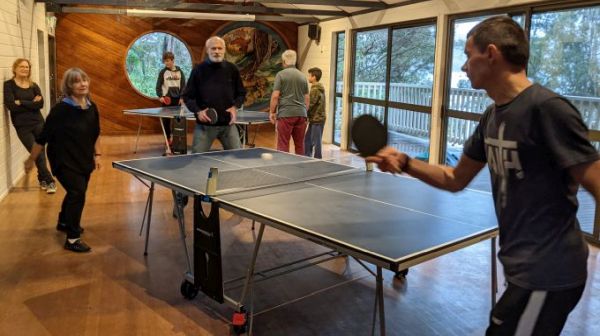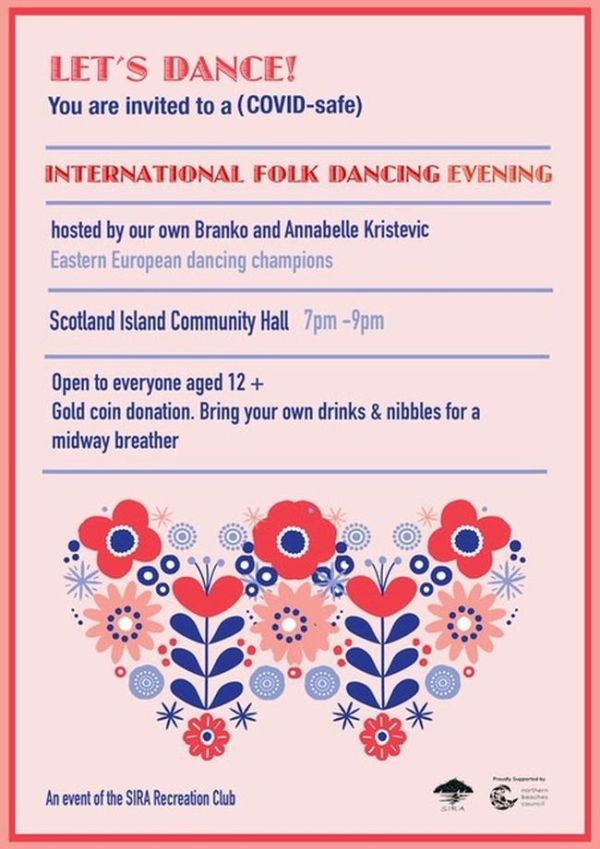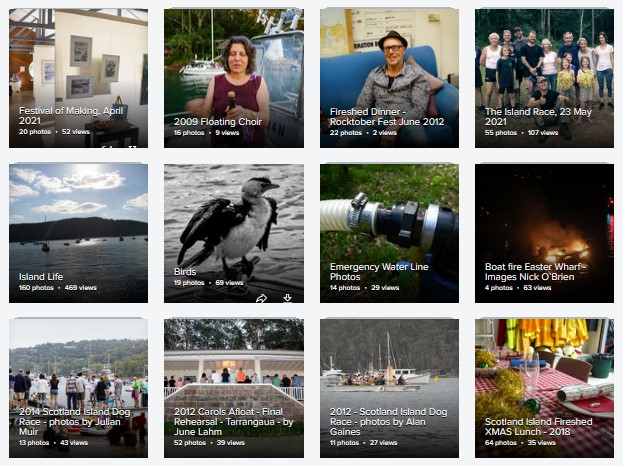| Having trouble reading this newsletter? Visit https://ymlp.com/archive_gesgjgm.php | |||||||||||||
 |
|||||||||||||
July 1, 2022 |
|||||||||||||
|
Newsletter for the
Offshore Residents of Pittwater, Australia - Volume 23,
Issue 1181
We acknowledge and pay our
respects to the Traditional Custodians of
Pittwater, as well as our Indigenous readers
|
|||||||||||||
ContentsIsland Road ErosionWho are the ones to blame?Roy Baker
 Pittwater’s offshore residents won’t need telling that this autumn was Sydney’s wettest in over 160 years. Besides the mud, one of the least attractive results of months of unrelenting rain was extensive damage to our roads and pathways, particularly on Scotland Island. None of us could stop the rain. But could we have done more to reduce the problems it caused? SIRA, Scotland Island's residents ' association, operates a reticulated water system, which pipes city water across to the island from Church Point. When it comes to meeting their water needs, most island residents fall into one of three categories. First there are those who, like myself, never buy water from SIRA. Instead they depend entirely on rainwater collected from their roofs. Then there are residents who never collect and rely solely on SIRA water. Finally, there are households who collect rainwater when they can and then top up their tanks with bought water as the need arises. If you want to remain popular on the island, be careful what you say about buying SIRA water: a number of residents seem to see it as indicating a lack of moral fibre. Others will rush to point out that for some rainwater collection simply isn't an option. That's true. But I've never been one to readily relinquish moral high ground for the sake of mere facts, So I set about looking into whether we can blame all those aberrant non-collectors for the state of our roads. And what I found out surprised me. Apparently SIRA brings enough water onto Scotland Island to fill more than seven Olympic pools each year. Imagine seven Olympic pools, dotted around the island, all being refilled once a year and, more to the point, all being emptied out with equal regularity. That's a lot of water, especially if it's left to run down our roads into Pittwater, gouging out channels along the way. SIRA claims to sell 'emergency' water, which implies that it is meant to supplement rainwater collection. What tends to rankle is the view, often voiced by longer-term residents, that islanders are starting to see SIRA water less in terms of supplementation and more in terms of substitution. In other words, residents are buying water instead of collecting rainfall. The question of supplementation versus substitution is important not only to those who enjoy a spot of moral grandstanding. It's also relevant to deciding the more serious question of whether changes in consumer behaviour could add to or ameliorate various problems facing the island, only one of which is surface erosion. Imagine that buying SIRA water is purely a matter of supplementation. In other words, everyone collects as much rainfall as they possibly can, and only use SIRA water to top up their tanks. Assuming that the availability of SIRA water can actually add to our woes (we'll come back to that question in a moment), the extent to which it does so would have to be relatively small. That's because during times of heavy rainfall SIRA sales would drop, meaning that the overall amount of water coming onto the island would be relatively constant. More rain, less SIRA water. Less rain, more SIRA water. But imagine now that buying SIRA water is entirely a matter of substitution: people buy water regardless of the weather. During periods of heavy rainfall the level of SIRA water usage would be maintained and things would really get wet. The issue of supplementation versus substitution is also relevant in terms of how SIRA sets its prices. SIRA doesn't want to profiteer from water sales, but neither can it make a loss. According to a substitution model, there may an argument for introducing a fluctuating spot price, charging more during wet periods to encourage rainwater collection. If water purchasing is a matter of supplementation then such a practice would be unconscionable. SIRA's pricing policy suggests that it envisages considerable supplementation. That means that predictions have to be made about future rainfall: the more it rains, the less water will be sold. For the forthcoming financial year, SIRA is assuming that its sales will be similar to those during each of the last two financial years. And so SIRA is keeping its price at $5 per kilolitre, the price first set in 2016.
Graph 1 charts annual rainfall against sales of water by SIRA. Out of the last seven financial years, 2017/18 was the driest and, not particularly surprisingly, there was a corresponding spike in water sales. But that's not the full picture. Even though subsequent years have been wetter, water sales have remained relatively high. Indeed, more water was sold during either of the two most recent financial years than was sold in either of the financial years ending 2016 or 2017. That’s despite the fact that rainfall has been trending upwards. This suggests that when it’s dry people buy water. Then, when it rains, they still buy water. That's substitution. Monthly sales for the financial year 2020/21 bear this out, as shown in Graph 2. Rainfall peaked in the autumn. And, admittedly, there was a corresponding drop in water sales. But the two are way out of kilter. Even though March precipitation was almost four times higher than the average for the preceding eight months, sales dropped by barely a third. So what about the latest financial year, the one with the wettest autumn on record? On a supplementation model you would expect SIRA water sales to be close to zero. But not so. Have a look at Graph 3. Compared to the 2020/21 year, the drop in SIRA sales during the wettest month, relative to the average for the preceding eight months, was even smaller. If residents weren't tempted to collect rainwater in March 2022, when will they ever? What emerges is a mixed picture. To a considerable degree the purchase of water is a matter of supplementation. All the same, there seems to be a trend towards using SIRA water even when there is plentiful rainfall. After the wettest autumn on record that becomes all the more apparent. So, where does that leave us in terms of denigrating all that transgressive water substitution? In a typical year, SIRA pipes over 18 million litres of water onto the island. Surely that's not good. But Boyd is keen for us to keep a sense of proportion. ‘What SIRA sells is a mere fraction of the total water that arrives on the island direct from the sky, even in dry years', says Boyd. 'It's really hard to imagine, but rainfall is a force of nature, while our human interventions are puny.' It's true. In recent years the island has received, on average, around 1.2 metres of rainfall per annum. That's enough to fill 264 Olympic pools. Of all the water that reaches the island in a typical year, only about 3% arrives through SIRA's pipeline.
Bear in mind that SIRA water reaches the island at a steady flow and then, having been stored in water tanks, is released by households into the environment at a fairly consistent rate. Rainfall, on the other hand, tends to be more concentrated, such as when we are deluged by a storm. We all know that it's the periods of heavy rain that cause the most road damage. But surely the more you fill your tanks with rainfall during storms, the less water is available to immediately run off into Pittwater, taking our roads with it? I would have thought that, even during a downpour, some water would soak into the soil, and that ground that's already sodden with household discharge will capture less surface runoff. But, according to hydrologist and island resident Fabienne d'Hautefeuille, that's not necessarily true. The ability of soil to absorb water depends on factors such as dryness and saturation ratios. 'For the hydrologist, some of the worst floods are when soils are super dry and cannot absorb any deluge'. The problem, it seems, is that dry soils can be too compacted to allow for infiltration. That brings into question the initial supposition that more water means greater problems. My high horse is starting to falter. Bear in mind, though, that in terms of water usage there's a lot more than surface erosion to consider. There are also the effects of water collection, storage and disposal on island flora and fauna, including those dratted mosquitoes. Fortunately, in my experience, islanders tend to have a relatively sophisticated understanding of the arguments surrounding water and sewage. The merits of buying and collecting water, as well as the advantages and disadvantages of introducing mains water to the island, have been widely canvassed over the last few years. We should be slow to point the finger of blame at those who buy water, rather than collect what falls from the heavens. Still, in the aftermath of the wettest period in living memory, it’s worth noting that SIRA water sales have barely dropped. That, I think, tells us something about ourselves. Thanks go to Boyd Attewell, Fabienne d'Hautefeuille and Tim Turpin for their help in writing this article. Any resident concerned about the quality of their water might be interested in a recent article published by the West Pittwater Community Association: click here.  Playing: it's more fun with friends!Jenny Cullen
Hey, the kindy playground is still there, aching for little children to enjoy it. The rain is easing and I’m now minding my two-year-old grandson. Who else would like to play and chat together? If there’s enough interest, we can book the hall to have inside space and some simple play and craft activity. Or just use the playground and park? For starters, I suggest Tuesday morning 9-11 am each fortnight, or even once a month. Or ….? If this sparks any interest, please email me at jennifercullen57@gmail.com.  Table TennisScotland Island Recreation CentreMost Saturdays throughout the year2 - 3 pm: Introduction to Table Tennis3 - 5 pm: Table Tennis practice Groups meet most Saturdays
and anyone over 12 is welcome. Sessions are supported by
the Scotland Island Recreation Club.
Play from 2 - 3 pm is
intended primarily for those new to table tennis. The
session from 3 - 5 pm is open to everyone, regardless of
your standard of play.
Sessions do not run every Saturday. If you are interested in taking part then it's best to join the table tennis WhatsApp group to receive up-to-date information on who is playing. If you would like to join the group, please email editor@scotlandisland.org.au. Alternatively, you can just turn up and take your chances. Adult players are asked to contribute $5 per player per attendance to defray expenses.  Scotland Island Fire Shed Dinner: Thai NightScotland Island Fire StationSaturday 2 July, 7 pm To book your tickets,
click here.
Scotland Island CaféCatherine Park, Scotland IslandSunday 24 July, 10 - 12 noon The Tuesday Discussion GroupScotland Island Recreation CentreTuesday 26 July, 11 am - 12.30 pmThe Recreation Club runs a discussion group, meeting on
the last Tuesday of each month, from 11 am to 12.30 pm
in the Recreation Centre. Everyone is welcome. Members take it in turn to design a session, choosing material for discussion. This can consist of essays, articles or podcasts, or a combination of all three. The idea is that group members shouldn't be committed to more than a few hours' preparation in terms of listening or reading. The idea is to be open to a wide range of topics and material. In June Jane Rich led a discussion on travel and tourism, asking whether they can ever give us what we are looking for.
For the June meeting, Michael Doherty will be asking whether the recently introduced prohibition on climbing Uluru should continue, and whether a similar ban should be applied to other landmarks. Reading: 'A Guide to Climbing Ayers Rock by Marc Hendickx. The group operates via a WhatsApp group, which will be used to distribute further information about this and future discussions. If you would like to be added to the group, please provide your mobile phone number to editor@scotlandisland.org.au. Alternatively, contact Jane Rich (janebalmain@hotmail.com) for more information or to express your interest in participating.  International Folk DancingScotland Island Community HallSaturday 30 July, 7 - 9 pm The Recreation Club
asks for $5 per person per attendance to defray
expenses.
Puberty
Workshop for Girls
|
Follow the PON: |
 |
 |
 |
The Online Local Contacts Guide
Click HERE to load
Pittwater Offshore Photo Gallery







 Mature,
qualified, educated caregiver with local references
available on Scotland Island and surrounding bays. High
needs and disability catered for. Experience with mental
health and disabilities. Qualified AIN and counsellor.
Flexible with hours.
Mature,
qualified, educated caregiver with local references
available on Scotland Island and surrounding bays. High
needs and disability catered for. Experience with mental
health and disabilities. Qualified AIN and counsellor.
Flexible with hours. 